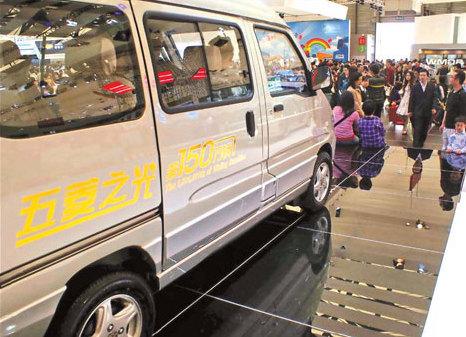
The minivan maker also turned to be quite successful in export market for its low-cost products. [China Daily]
Hoping to grab a share of the lucrative entry-level auto market, China's biggest minivan producer SAIC-GM-Wuling Automobile Co announced its first self-developed car brand, the Baojun, on July 18 in Shanghai.
The three-way tie-up between SAIC Motor Corp, General Motors and Guangxi-based Wuling Motors plans to offer a new Baojun model every year.
The first, a compact, will be launched later this year, followed by a subcompact due next year and a small-sized SUV and MPV in 2012 and 2013, the joint venture said.
The brand is set to meet growing demand for "affordable passenger cars" in China, the company said without disclosing possible sticker prices.
The target market of Baojun brand has been the fastest growing segment in the past three years and totaled 48 percent of the overall domestic passenger car market in 2009, up from 36 percent in 2006, according to figures provided by the company.
An entirely new brand stands a good chance in the Chinese car market due to rapid economic growth, increasing urbanization and the more diverse demands for automobiles to meet individual tastes, said Chen Hong, president of SAIC.
The name Baojun - or treasured horse in Chinese - represents the reliability that stems from mature technology offered by the venture's experienced US and Chinese parents.
Based on the prototype of GM's Buick Excelle model, the first Baojun is under development with help of GM and SAIC's joint venture Pan Asia Technical Automotive Center in Shanghai.
Low-cost strategy
The joint venture plans to replicate the low-cost strategy that proved successful in its minivan business.
"We aim to surpass customer expectations by creating a brand that combines world-class quality with low ownership costs," said Shen Yang, general manager of SAIC-GM-Wuling.
The Baojun brand is also a part of SAIC's strategy to develop its own brand cars and will compete with local brands Geely and Chery, said the group's president Chen Hong.
SAIC has two other wholly owned brands - the Roewe and MG - in a higher price range than the Baojun.
Kevin Wale, president and managing director of GM China, thought the new brand is complementary to GM's portfolio in China as well.
"The introduction of the Baojun is part of GM's multi-brand strategy in China - it will enable us to better address the increasingly segmented Chinese vehicle market," he said.
SAIC-GM-Wuling will develop new dealerships for its passenger cars, but will also make use of its existing huge commercial vehicle dealer network, which includes some 2,400 outlets across the country.
The joint venture now operates production facilities in Liuzhou in Guangxi and Qingdao in Shandong, with combined capacity of 890,000 units a year.
To prepare for the production of the Baojun, the venture recently started buildup at both sites for an additional yearly output of 420,000 units, expecting to reach a total annual capacity of up to 1.31 million units within two years.
Steady growth
Thanks to government incentives, the joint venture sold 1.06 million vehicles last year, becoming the first single carmaker in the nation that broke through the 1 million-unit mark.
In the first six months this year, the venture remained its dominating position in the minivan segment with delivery jumping 30 percent from a year ago to more than 680,000 units.
The minivan maker also turned to be quite successful in export market for its low-cost products, and thus became an important partner of GM as the US automaker eyed the emerging markets like countries in Asia and Latin America.
GM has begun to sell Wuling-brand minivans under its Chevrolet badge in Latin America two years ago.
Last year, SAIC and GM established a 50-50 joint venture in India to produce and sell GM cars and Wuling minivans there.
The all-new Baojun could be built and sold in India or shipped to other countries in the future, said recent Chinese-language media reports.
SAIC-GM-Wuling also produces the Chevrolet Spark with the Chinese name Lechi, the only passenger car it made before the birth of the Baojun.
The Lechi sold 60,000 units in China in 2009. Its sales between January and June this year increased 13 percent from a year ago to over 41,000 units.
Aware of the increasing importance of China in the global auto world, GM broke ground for its new technology center in Shanghai last week, its third in the nation following the Pan Asia Technical Automotive Center also in Shanghai and its China Automotive Energy Research Center in Beijing.
The new center will develop advanced vehicle designs and technology solutions for GM on a domestic and global basis when it is completed by the end of next year.
More than 300 engineers, technicians, designers and researchers will be recruited within five years.





